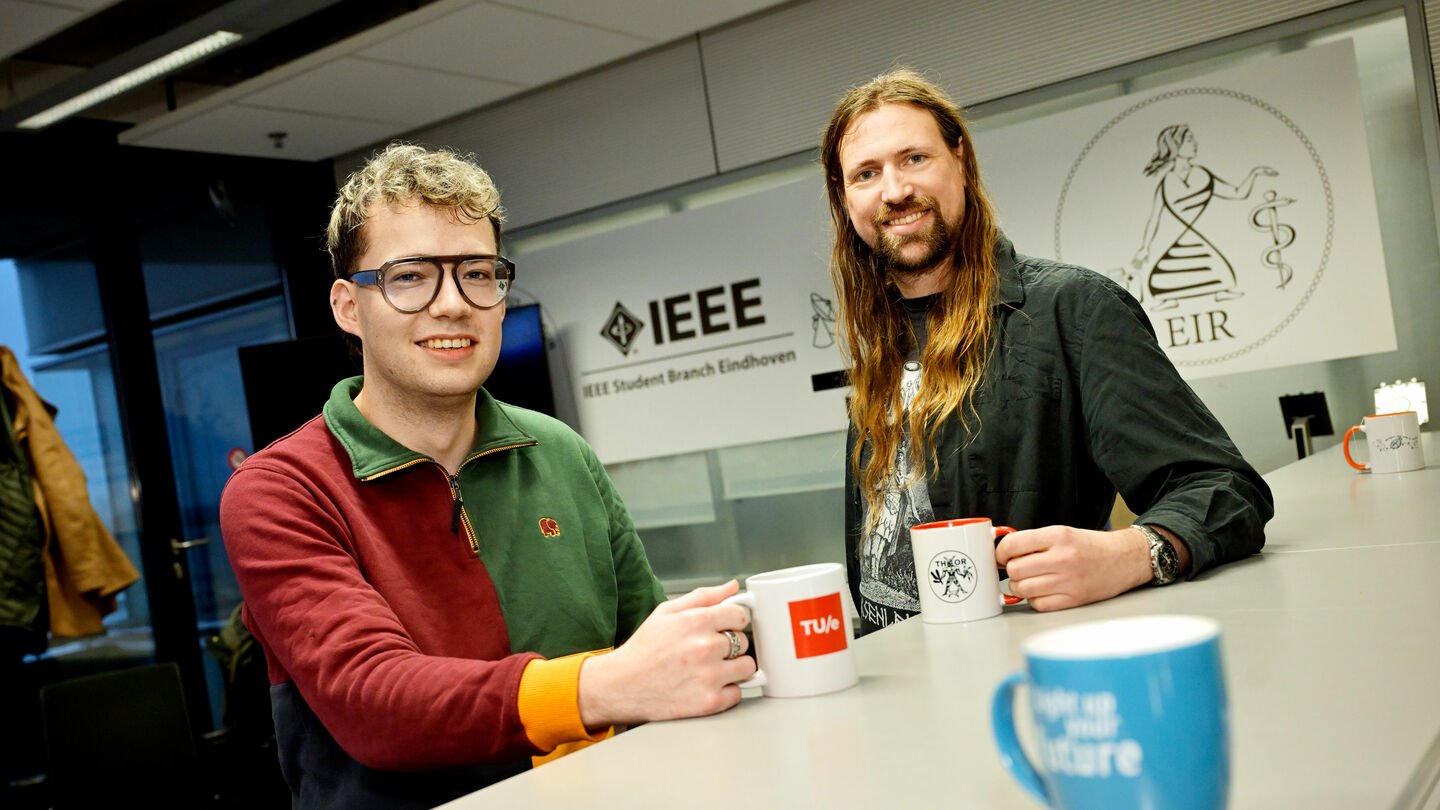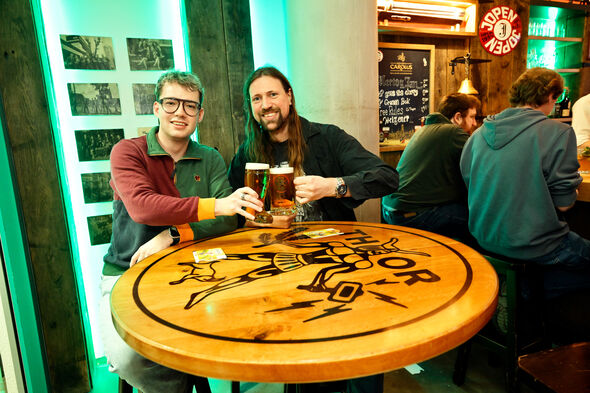
“Together we studied for about 25 years”
These days, taking a bit longer to complete your bachelor’s or master’s degree is the rule rather than the exception. Factors that may come into this are motivation, subject matter, side jobs, or a board year at an association. Fer Radstake (34) and Meeuwis van den Hoek (27) finally got their master’s degrees after 15.5 and 9.5 years of studying, respectively. In this interview, the Electrical Engineering (EE) alumni talk about the reasons for their delay, what they got out of it, and what tips they would give fellow long-term students.
Both men recently graduated, half an hour apart. “We had a competition on who would graduate first and in the end Fer claimed a narrow victory,” Van den Hoek says with a laugh.
What caused your delay?
Van den Hoek: “With me, it actually had to do with two things. First, I decided very early on that I wanted to do more than just study. I wanted to do an board year and all kinds of other things with our study association Thor. So for about seven years, one day a week, I volunteered as a bartender at Walhalla (Thor’s own bar, ed.). In the process, I sometimes got a little too active with the association, haha."
"Also, in my opinion, there are too many tracks within the Bachelor of Electrical Engineering. During your bachelor’s, you’re required to explore all of these tracks, but I was only interested in half of them, and that really caused motivation problems for me. My delay, therefore, mainly took place in my bachelor. I took seven years to complete my bachelor’s and only two and a half years for my master’s. That’s really because in the master’s program, unlike the bachelor’s, I was doing things I liked.”
Radstake: “I too ran into the same motivation problems. There are so many tracks, so chances are that some of them simply don’t appeal to you. And on top of that, I studied for so long that some courses I had already completed at one point no longer counted in the updated curriculum when this was changed. As a result, I had to redo about thirty credits, which didn't help with motivation either."
like Meeuwis, I also did a board year at Thor. And during my master’s I did another board year but for ODIN
"In terms of extracurricular activities, like Meeuwis, I also did a board year at Thor. In theory, that takes one year, but before that year starts you’re already working on your board plan, and after your board year you have to get back into student life. It will differ from person to person, of course, but with me it basically caused almost two years of delay. And during my master’s I started doing board officer year but for ODIN, Thor’s sub-association for master’s students. One of the things I did for that association was organize two study trips to Germany, where we went to visit companies such as Huawei and the Technical University of Munich.
In addition, Meeuwis and I also worked during our studies, both of us in ICT-related positions here on campus by chance. I was with the helpdesk for employees and Meeuwis with the one for students. Specifically during COVID I had a lot of trouble studying; I basically had a two-year break. During that period I started working extra hours at ICT.”
Did you ever get demotivated because it took so long?
Van den Hoek: “Certainly, I also doubted for a long time whether I should do a master’s at all, because getting my bachelor’s degree was already taking so long. But then I pulled myself together and thought: if you don’t do it now, then you’ll never do it. Then when I got into the master’s it suddenly went much easier than I thought it would because I was really doing a subject I liked. In hindsight, I’m very glad that I went for a master’s after all.”
I even wondered if I shouldn’t quit the bachelor’s, or maybe switch to a university of applied sciences
Radstake: “I’ve definitely been demotivated many times. I even wondered if I shouldn’t quit the bachelor’s, or maybe switch to a university of applied sciences. But at some point you’ve been at it so long that you think: quitting or transferring would be a shame, now I just want to finish it.
And I also doubted whether or not to do a master’s degree. But during my final bachelor’s project I was able to choose a subject all by myself and then suddenly everything went very smoothly. I even won the KIVI prize for best final project. During this period I also came into contact with the department where I eventually ended up doing my master’s. Only then I knew for sure that I liked what I was doing and I would go on to do a master’s after all.”
Any regrets?
Van den Hoek: “No, actually. Because all the things I did alongside my studies made me the person I am today. Without those things, I wouldn’t be where I am today. I know exactly what I want and I’ve made some really great contacts in the process. Sure, I sometimes find it a pity that it took so long, but I have no regrets.”
Radstake: “When it comes to the big things – like the board years at Thor and ODIN – I have absolutely no regrets. Those are experiences you pretty much can’t get anywhere else. So if people are unsure about a board year I would definitely recommend doing one. However, in hindsight I do think that it might have been better to continue studying certain areas, but anyway, I managed in the end.”
How did your environment react to your study delay?
Van den Hoek: “In my family it was sometimes difficult, but that’s also because I’m the first in my extended family to go to university. For example, they didn’t really understand why someone would pause their studies for a year to do a board year, so explaining those kinds of things was sometimes difficult. But in the end, my parents were mostly very proud of everything I did and achieved.”
Radstake: “I owe quite a lot to my friends. They really helped me to keep going and eventually get my bachelor’s and master’s degrees.”
Van den Hoek: “In the end, the study delay Fer and I suffered also became a bit of an in joke among friends, turning into a competition of who would graduate first. At first it looked like I would be the one, because I started my final project two weeks earlier, and so my final presentation was scheduled a little earlier than Fer’s. But then the date of my final presentation was set two weeks later than expected.”
Radstake: “But then my professor called in sick the night before my presentation and my presentation was also rescheduled, by a week. In the end, both graduation dates fell on the exact same day, but mine was half an hour earlier, so in the end I won.”
What is your next step now that you’ve graduated?
Van den Hoek: “I am going to do a traineeship, so for two years I will do different projects at companies in different positions, at the same time taking training courses to eventually find a position as a project manager.”
Radstake: “I’m looking around at the moment, but in any case I’m sure I want to stay in my current field – image processing. I would like also to see if there are any nice follow-up research projects on that subject here at the university that I could get into.”
Is it hard to leave your student days behind after such a long time?
Van den Hoek: “I’m at a point where I think it’s okay; it’s time for the next step. But I’ll keep working in Eindhoven so I can always meet up with my friends to have a drink at Walhalla. I’ll never be completely gone.”
Radstake: “Friday night is sort of the standard time for EE graduates to gather at Walhalla. It happens regularly that people from ten years ago drop by for a drink. I also think that in ten years’ time, you’ll still be able to find me in Walhalla now and then.
What tips would you give fellow long-term students?
Van den Hoek: “Once you’re in your master’s program – and really doing a track you like – it will suddenly get a lot easier. Without wanting to sound melodramatic, there really is light at the end of the tunnel.”
Radstake: “I think it’s even a bit earlier when things get easier, during your final bachelor’s project at the end of your bachelor’s program. So many people told me that it all went relatively smoothly from then on. Not because the subject matter is easy, but because you enjoy it and chose it yourself. That gives a tremendous boost to your motivation.”


Discussion